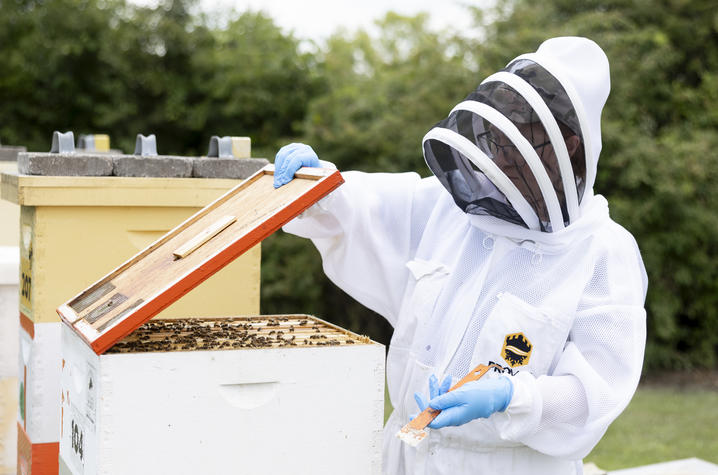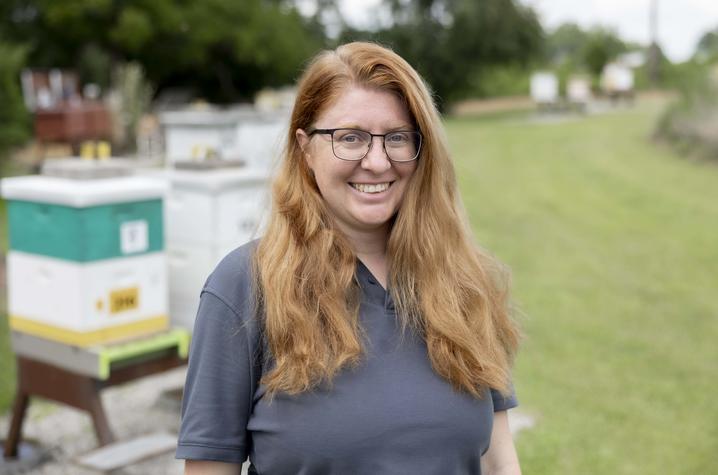‛Bee-ing’ prepared: How UK education equipped the state’s new apiarist
FRANKFORT, Ky. (Aug. 14, 2024) — University of Kentucky alumna Amanda Skidmore stepped into her new role as state apiarist for the Kentucky Department of Agriculture in April 2024.
As Kentucky’s apiarist, Skidmore oversees vital regulatory and educational duties, from inspecting honeybee colonies for diseases to advising beekeepers on best practices. She also takes on the important task of educating the broader community about the essential role bees play in the ecosystem.
“I’m excited,” Skidmore said. “It’s a great position that allows me to be flexible in building a program to address beekeepers’ needs.”
Though most of Kentucky’s beekeepers are hobbyists rather than commercial producers, bees are vital to the state’s agriculture industry, making the state apiarist a key position.
“Bees are super important to Kentucky,” Skidmore said. “Every crop that we grow is going to have an impact from an insect in some way — it’s either going to need a bee to help pollinate it, or it's going to have pests that we need to learn how to control and manage.”
Skidmore said her knowledge of bugs and bees is rooted in her time at UK, which began with a Department of Entomology internship when she was in high school.
“I got very interested in insects, bugs — everything that was related to science,” she said.
At UK, she earned her bachelor’s degree in sustainable agriculture and entomology in 2013, followed by a doctorate degree that focused on integrated pest management for small specialty crops in Kentucky.
“To this new position, Dr. Skidmore brings a wealth of understanding of Kentucky agriculture, pollinator and pesticide stewardship to better advance honeybees and beekeeping in Kentucky,” said Ric Bessin, extension professor in the UK Department of Entomology.
As an undergraduate and graduate student, Skidmore worked with Bessin on a multistate research project to develop more sustainable pest management strategies for squash and melon production. Skidmore evaluated the effects of combining insect netting, plasticulture and strip tillage on insect natural enemy populations and yield and quality of the produce. She also studied how the squash bee selects nesting locations in crop fields. Skidmore, Bessin and team members published results in HortTechnology in 2019.
Outside the classroom, Skidmore gained valuable experience through UK Cooperative Extension Service, giving presentations to stakeholders across the state. Most students can’t say they gave 40 extension presentations before even graduating, but Skidmore did. This gave her an opportunity to explore the career path of science communication and outreach.
“That was something I found really exciting, that ability to be the bridge between science at the university and real-world problems and situations — and trying to help build the connection,” she said. “So, extension and outreach is something I’ve been very passionate about throughout my career.”
As state apiarist, Skidmore will continue to work alongside UK Extension. Many county-level beekeeper groups meet at extension offices, and Skidmore will often work with extension personnel to give guidance to Kentucky producers.
“Having a network of extension offices and educated beekeepers is awesome because it keeps our bees healthy and it helps promote the industry,” Skidmore said.
Another benefit of that network: It’s simply fun to be in a strong community of people who love the same thing.
“All beekeepers are just actually wonderful people,” said Don Chesak, president of the Oldham County Beekeepers Association. “We love to help each other and learn from each other.”
The sense of community among beekeepers is mirrored in honeybees themselves — Skidmore’s favorite bee characteristic.
“I really enjoy watching how bees work together,” she said. “The colony structure is really unique, to have a matriarchal system with a queen that lays eggs. It’s really cool to see that structure and the way they communicate with each other and just the importance to agriculture.”
Chesak says having a state apiarist like Skidmore as part of that community is good for everyone and for Kentucky. When beekeepers have concerns, Skidmore can communicate with state officials, so they understand what is happening at the local level.
“Having her in the middle is going to be a huge advantage for us to help us ensure our bees in Kentucky stay healthy,” he said.


As the state’s flagship, land-grant institution, the University of Kentucky exists to advance the Commonwealth. We do that by preparing the next generation of leaders — placing students at the heart of everything we do — and transforming the lives of Kentuckians through education, research and creative work, service and health care. We pride ourselves on being a catalyst for breakthroughs and a force for healing, a place where ingenuity unfolds. It's all made possible by our people — visionaries, disruptors and pioneers — who make up 200 academic programs, a $476.5 million research and development enterprise and a world-class medical center, all on one campus.




